Norms | UPSC Mains: Ethics, Integrity & Aptitude PDF Download
Norms

- Definition of Norms: Norms are social expectations that dictate acceptable ways of behavior in a community or group.
- Informal Guidelines: Norms are usually informal rules that guide right or wrong behavior within a specific group or community.
- Collective Expectations: They represent the collective expectations that community members have of one another.
- Social Control: Norms act as a form of social control or pressure, encouraging individuals to conform, fostering uniformity, and discouraging deviant behavior.
- Expression of Norms: Norms are often expressed through social customs, folkways, or mores.
- Order in Society: They help maintain order in society. For example, in traditional societies, it is a norm that a son must obey his father’s commands and fulfill his wishes.
- Punishment for Non-Conformance: Failure to conform to norms leads to punishment, which may include being looked down upon, mocked, scolded, boycotted, or required to perform penance.
- Evolution into Laws: Laws evolve from norms, formalizing expectations of behavior. Deviants are subjected to trials in a court of law and punished accordingly.
- External vs. Internal: Norms are externally imposed, whereas beliefs and values are internal to individuals. Norms provide specific behavioral guidance, while values offer indirect guidance.
- Principles: Unlike values, beliefs, and morality, which differ among individuals and cultures, principles are universal rules or laws. They reflect universal truths and standards such as fairness, truthfulness, equality, and justice.
The document Norms | UPSC Mains: Ethics, Integrity & Aptitude is a part of the UPSC Course UPSC Mains: Ethics, Integrity & Aptitude.
All you need of UPSC at this link: UPSC
|
78 videos|136 docs
|
FAQs on Norms - UPSC Mains: Ethics, Integrity & Aptitude
| 1. What are norms in the context of UPSC exams? |  |
Ans.Norms in the context of UPSC exams refer to the established standards and guidelines that govern the examination process, including eligibility criteria, syllabus, examination pattern, and evaluation methods.
| 2. How do norms affect the preparation strategy for UPSC aspirants? |  |
Ans.Norms influence the preparation strategy for UPSC aspirants by outlining the subjects to be studied, the format of the exams, and the weightage of different topics, helping students to prioritize their study plans effectively.
| 3. Are there any changes in norms for UPSC exams recently? |  |
Ans.Yes, norms for UPSC exams can change from time to time, including alterations in exam patterns, syllabus updates, or eligibility criteria. Aspirants should regularly check the official UPSC website for the latest information.
| 4. How important are norms in ensuring fairness in the UPSC examination process? |  |
Ans.Norms play a crucial role in ensuring fairness in the UPSC examination process by providing a standardized framework that all candidates must adhere to, thus promoting equality and transparency in the evaluation process.
| 5. What should candidates do if they believe the norms have been violated during the UPSC exams? |  |
Ans.Candidates who believe that norms have been violated during the UPSC exams can lodge a formal complaint with the UPSC authorities, providing necessary evidence and details to support their claims, which will be investigated accordingly.
Related Searches
















